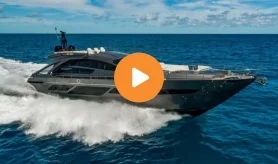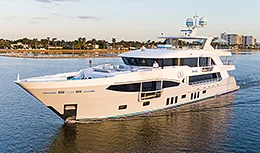- Alaskan Yachts
- Azimut Yachts
- Back Cove Yachts
- Beneteau Yachts
- Benetti Superyachts
- Bertram Yachts
- Boston Whaler
- Broward Yachts
- Buddy Davis Sportfish
- Burger Yachts
- Cabo Yachts
- Catamarans
- Carver Motoryachts
- Center Console
- Chris-Craft Yachts
- Cruisers Yachts
- DeFever Trawlers
- Dufour Sailboats
- Fairline Yachts
- Feadship Yachts
- Ferretti Yachts
- Formula Yachts
- Fountaine Pajot Cats
- Grady-White
- Grand Banks Trawlers
- Hargrave Yachts
- Hatteras Yachts
- Hinckley Picnic Boats
- Horizon Yachts
- Hydra-Sports
- Intrepid Boats
- Jarrett Bay Sportfish
- Jeanneau Yachts
- Kadey-Krogen Trawlers
- Lazzara Yachts
- Lekker Boats
- Luhrs Sportfish
- Marlow Yachts
- Maritimo Yachts
- Marquis Yachts
- Mazu Yachts
- McKinna Motoryachts
- Meridian Yachts
- Midnight Express
- MJM Yachts
- Mochi Craft
- Neptunus Motoryachts
- Nordhavn Trawlers
- Nordic Tugs
- Numarine Yachts
- Ocean Alexander Yachts
- Ocean King
- Offshore Yachts
- Outer Reef
- Oyster Sailing Yachts
- Pacific Mariner Yachts
- Palmer Johnson Yachts
Yacht Surveys – FAQ
Frequently Asked Questions: Getting a Survey
Q: Why get a yacht survey?
A: The purpose of obtaining a pre-purchase survey is to discover the overall condition of a boat before you buy it. To accomplish this goal a good surveyor will spend hours observing and testing all major systems, electronics, galley equipment, and other items important to the function and fit of your future boat.
The two most important tools that a surveyor possesses do not consist of a box of fancy digital instruments, but his experience and his skills in observation. Needless to say, the better educated, the more experienced, more careful a surveyor is, the higher the caliber of his work.
The surveyor is working for you (after all he is being paid by you); it is his job to make sure the boat you’re buying doesn’t have any major deficiencies or unexpected surprises.
Q: Are all yacht surveys the same?
A: Yes & No. Not all areas of the nation support full-time surveyors simply because there aren’t enough boats to justify the employment of a large marine workforce. Some parts of the country only support part-time surveyors, and because of this, survey procedures are not standardized nationally.
Boating centers like Florida, California and some areas of the Atlantic Coast (including the Carolinas, Maryland and Virginia) are capable of supporting professional full time marine surveyors, which makes the marine survey procedures very similar in these parts of the country.
Q: How many parts are there to a typical yacht survey?
A: Surveys consist of three distinct aspects:
1) In-water inspection.
2) Haul-out to inspect the hull, zincs, and gear.
3) Sea trial.
A survey isn’t complete without performing these three aspects. The sea trial involves not only performance testing the vessel and its engines, but is also the time when many major systems are observed and tested.
Q: What’s the benefit of a sea trial?
A: One of the major benefits of a sea trial is that you get a terrific opportunity to feel how the boat performs. This is a great opportunity to confirm the boat you’re purchasing is right for you.
On the sea trial a surveyor not only has the opportunity to evaluate the engine and overall performance, but also to test the steering, controls, shafting, engine mounts and exhaust systems as well. When a sailboat is being surveyed, the overall sailing systems are also tested.
It is very beneficial to conduct a sea trial in open-water. Short stints down a canal usually won’t cut it. This is one of the logistical questions that need to be answered when making arrangements for the survey.
Good surveyors recommend open ocean trial runs whenever possible. However, when sea conditions are rough, you have to defer to the seller’s discretion because of the risks that are raised if you insist on going out in rough water.
Q: How long does a yacht survey usually take?
A: It is wise to schedule an entire day for the survey, even for smaller boats. Generally, nobody knows how long the survey will take. The time involved is mainly a factor of the condition of the boat rather than size or age.
Q: How important are sea conditions during a survey?
A: Survey conditions are very important. The quality of the survey can only be as good as the conditions under which it is conducted. The surveyor can be faced with a few challenging factors, including a lot of people on board, limited time the vessel is available, poor weather, or a host of other negative circumstances. The surveyor has to conduct his work in an orderly fashion, meaning that there is a certain order of events that has to take place.
- The surveyor can’t work in an engine room where the engines have been run and the temperature is 125 degrees. It’s already hot enough without adding engine heat to the mix. Therefore, the surveyor will need at least 2 hours with the vessel before the engines are run and the vessel is moved from the dock.
- Hull surveys can be successfully performed in conjunction with an engine survey.
- We often run into problems where no power, or inadequate shore power is available to test systems. This is very common with boats docked at private residences. In some cases, the best a surveyor can do is to test A/C systems on generator power.
Q: When do I get my survey results?
A: You will typically receive a full-written report within 2-4 days. While a surveyor will be able to give you a decent verbal recap and possibly a walk-through, it is highly recommended that you wait until you review the full-written report.
Q: Can you provide me with a list of yacht surveyors?
A: Yes, the list below contains a few surveyors that we’ve worked with in the past. However, it’s very important to know that we’ll want you as the Buyer to select your own surveyor as to eliminate any conflicts of interest. If you don’t know of any, a very good place to start looking is www.MarineSurvey.org which contains a full list of SAMS-certified surveyors.



